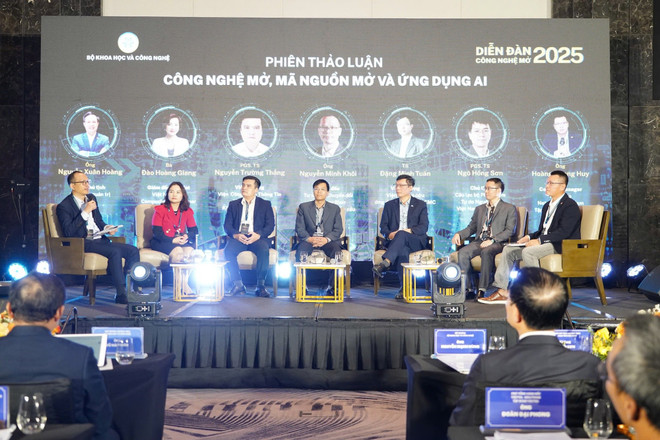Vietnam has chosen to pursue this direction — developing open technologies, open-source software, and open data — to enable individuals and enterprises to co-create new values. With this approach, it will become a technology-driven nation that both benefits from and contributes to global knowledge.
Minister of Science and Technology Nguyen Manh Hung speaks at the Vietnam Open Technology Forum 2025 in Hanoi on November 3. (Photo: VNA)
To take control of its digital future, Vietnam must master artificial intelligence (AI), and to master AI, the country must embrace open technologies with shared and secure data, domestic computing infrastructure, and a co-creative community – the shortest path forward.
This was the key message delivered at the Vietnam Open Technology Forum 2025, organised by the Ministry of Science and Technology in Hanoi on November 3.
Held under the theme “AI with Open Technology and Open Source”, the forum aimed to connect policymakers, researchers, businesses, and technology experts to exchange visions, experiences, and solutions for harnessing AI and open technologies in the national digital transformation. The event also provided a platform for reviewing recent achievements, discuss new technology trends, and promote the spirit of openness, cooperation, and innovation within Vietnam’s technology community.
Major domestic and international tech corporations joined the forum, including Quantum, Palo Alto Networks, Arista Networks, and Viettel, among others. Their participation helped enhance international cooperation, knowledge sharing, and support for Vietnam’s digital infrastructure, particularly in developing open AI and open-source ecosystems.
In his opening remarks, Minister of Science and Technology Nguyen Manh Hung stressed that the greatest innovation is the innovation of the people; and innovation for all can only happen when technology is open. Open technology, he said, unleashes the creativity potential of every individual.
According to the minister, open technology is not limited to open-source software but also includes open architecture and open standards. Many countries now require that key national infrastructure be built on open technologies.
He added that Vietnam has chosen to pursue this direction — developing open technologies, open-source software, and open data — to enable individuals and enterprises to co-create new values.
With this approach, Vietnam will become a technology-driven nation that both benefits from and contributes to global knowledge, Hung said.
 Speakers join a discussion on open technologies and AI application at the forum. (Photo: VNA)
Speakers join a discussion on open technologies and AI application at the forum. (Photo: VNA)He affirmed that developing and mastering digital technologies based on open standards is not only a commitment but also a strategic action plan for Vietnam’s digital breakthrough. He noted that openness protects people, accelerates innovation, and narrows the technology gap. It also helps ensure technological sovereignty in AI while fostering an ecosystem for startups and small businesses, creating multiple layers of applications that bring AI closer to everyone.
Participants in the forum perceived that an AI ecosystem is only successful when knowledge is shared and developed continuously, and that even the smallest contribution can become a shared asset of the nation.
They shared the view that to sustainably develop open AI, Vietnam should build a network based on four pillars: the State creates policies and invests in infrastructure, businesses lead in technology, institutes and universities provide training and do research, and the community contributes open knowledge. By doing so, the country can form a public – private alliance, foster innovation and digital sovereignty, and develop AI for the people, demonstrating its commitment to safe, humane, and sustainable AI development and contributing to global knowledge and open source communities./.